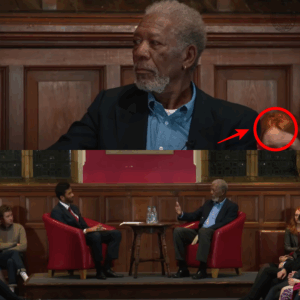“Hollywood Only Sees One Color – Green”: Morgan Freeman Gets Candid on Racism and Misogyny in the Film Industry
In a recent interview, legendary actor Morgan Freeman opened up about his views on race and gender in Hollywood, offering a perspective that’s both surprising and thought-provoking. Known for his powerful voice and commanding presence on screen, Freeman didn’t hold back when asked about issues of discrimination in the entertainment industry.
.
.
.
“Don’t Call Me African-American”
When asked about the label “African-American,” Freeman was quick to clarify his stance.
“No, I don’t mind the term African-American. I just don’t want to be called African-American. I’m not African,” he stated firmly, making it clear that he prefers to be recognized simply as an American, not defined by his race or heritage.
Racism in Hollywood? “It’s All About the Money”
Freeman went on to address the issue of racial discrimination in Hollywood. Contrary to what some might expect, he believes that the industry’s primary concern isn’t race, but profit.
“I don’t think there is an issue of race in Hollywood,” Freeman said. He explained that since the 1970s, Hollywood has shifted towards “open casting,” with a much broader representation of backgrounds on television and in movies.
He cited the success of the 1970 film Cotton Comes to Harlem, directed by Ossie Davis, as a turning point.
“It made hundreds of millions of dollars. And of course, Hollywood is colorblind. It only sees green. If it makes money, it’s a good thing. Therefore, the walls came tumbling down.”
For Freeman, the bottom line is clear:
“Hollywood only cares about one color – green.”
On Misogyny: Is Hollywood Unfair to Women?
The conversation then turned to the portrayal of women in Hollywood, a topic that has sparked heated debate in recent years. But Freeman pushed back against the idea that women are consistently portrayed unfairly.
He listed a number of acclaimed actresses—Meryl Streep, Cate Blanchett, Julia Roberts, Renée Zellweger, Charlize Theron, Uma Thurman, Nicole Kidman—who have been given strong, complex roles.
“I don’t think there was an unfair portrait of women in Hollywood,” he said. “If someone thinks differently, we’ll talk about that.”
Hollywood’s Real Agenda
Both on the issues of race and gender, Freeman’s view is pragmatic, even blunt:
“Hollywood only sees it as one duty: stay in business, whatever that takes. We make movies to make money to make movies. That’s the bottom line.”
He emphasized that Hollywood doesn’t have a social agenda beyond profit.
“They don’t get on a social high horse. We make movies to make money. That’s it.”
Final Thoughts
Morgan Freeman’s candid remarks challenge many of the prevailing narratives about Hollywood and discrimination. For him, the industry’s driving force isn’t ideology or prejudice—it’s profit. Whether you agree or disagree, Freeman’s perspective is a reminder that in the world of film, money often speaks louder than anything else.
News
Heartbreaking: Hulk Hogan’s Last Wish Revealed—You Won’t Believe His Ultimate Regret!
Hulk Hogan’s Final Tragedy: Wrestling Icon Dies Estranged from Family, Never Meeting His Grandchildren July 2025 – The world of…
Astronomer Hires Gwyneth Paltrow—Her EPIC Response to Chris Martin’s Controversy!
Gwyneth Paltrow’s Ultimate Power Move: How She Turned Her Ex-Husband’s Joke Into Tech’s Most Brilliant PR Stunt Boston, 2025 In…
Leaked Footage SHOCKS Fans: Kristin Cabot & Billionaire Andy Byron in Hot Water After Coldplay Kiss Cam!
The $38 Million Kiss: How a Viral Coldplay Concert Clip Sparked the Most Expensive Scandal in Tech History Boston, July…
Melania BETRAYS Trump: Epstein Bombshell DROPS at the WORST Possible Moment!
Melania’s Revenge: Will Trump’s Wife Be the Ultimate Betrayer in the Epstein Scandal? She Was Never Loyal—And Now the Truth…
Elon Musk EXPOSES Trump’s Criminal Secrets—Ghislaine Coverup UNRAVELS LIVE!
When Justice Is for Sale: The Maxwell Gambit, Trump’s Power Play, and America’s Crisis of Truth Washington, August 2025 —…
King Charles SHOCKS Trump & Melania With LIVE TV Bombshell—Watch Trump Explode!
The Final Unraveling: Trump’s Epstein Inferno Reaches the Palace Gates August 2025, London/Washington — The wildfire of the Epstein scandal…
End of content
No more pages to load













